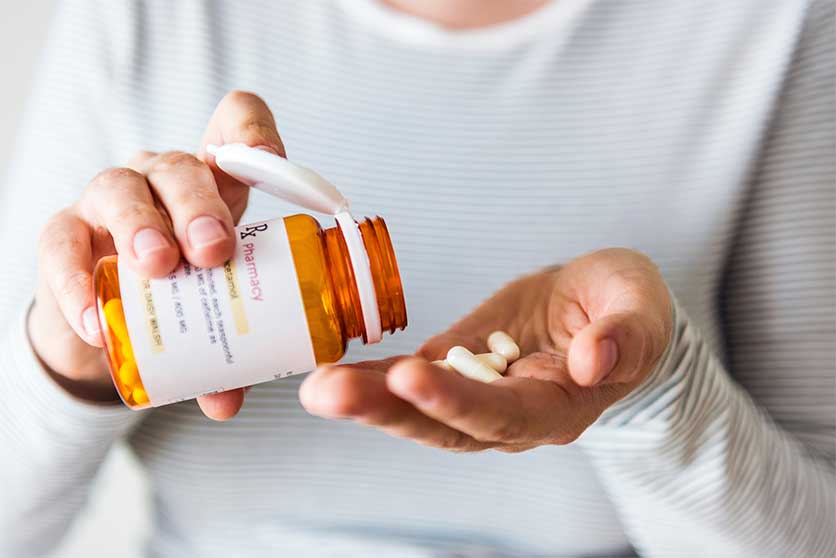Can You Bring Prescribed Medications To Inpatient Rehab?
Inpatient alcohol and drug rehab centers have different policies covering prescription drug use and access among program participants. In general, you should expect to have access to your doctor-prescribed medications unless those medications have the potential to be addictive or abused.

Inpatient medical detox and rehabilitation programs are healthcare services intended to benefit your overall health and wellness.
This means that you will likely not be denied prescription medications that you need to treat specific medical conditions, except when those medications are prone to abuse or have contributed to your addiction.
Rules For Prescription Drugs In Residential Treatment
Different rehab programs have their own specific rules and policies surrounding prescription medications and other aspects of treatment.
However, some of the most common rules to be aware of include:
- all medications must be properly prescribed to the patient by a licensed healthcare provider; no samples or drugs prescribed to a different person will be allowed
- medications must be brought in a sealed container with all pertinent information attached
- only enough medication can be brought to approximately cover the length of the patient’s stay
- certain over-the-counter medications and vitamins may be permitted if they are brought in unopened, sealed containers (to prevent prior tampering)
- products with alcohol listed as a major ingredient, including over-the-counter or off-the-shelf medications, will often not be accepted (e.g. certain mouthwashes)
- nicotine patches are usually permitted
Commonly Permitted Prescription Drugs
A few examples of prescription drugs that are generally allowed in a rehab setting include diabetes medications, medications for high blood pressure, certain antidepressant medications, certain allergy or asthma medications, and antipsychotic medications.
Always discuss your specific needs with a representative from your chosen rehab facility before your program begins.
Commonly Restricted Prescription Drugs
Unfortunately, those who struggle with substance abuse and addiction often also struggle with chronic pain, anxiety, depression, and other physical or mental health conditions that are treated with the use of restricted and potentially addictive prescription drugs.
These medications will generally be banned from the treatment center and replaced with alternatives with lower potentials for abuse whenever possible.
Or, on a situational basis in which there are no effective alternatives, they may be administered by facility staff in private and otherwise stored securely.
Examples of commonly restricted or controlled prescription drugs include:
- benzodiazepines like Alprazolam (Xanax), lorazepam (Ativan), clonazepam (Klonopin), and diazepam (Valium)
- opioids/opiates like morphine, codeine, oxycodone (OxyContin), hydrocodone (Vicodin), and oxymorphone (Opana)
- stimulants like amphetamines (Adderall), methylphenidate (Ritalin), and dextroamphetamine (Dexedrine)
Medication-Assisted Treatment (MAT)
MAT is an evidence-based approach to treating SUDs that uses FDA-approved medications in combination with psychotherapy and other treatment interventions.
This approach has been shown to be effective in the treatment of opioid use disorder and alcohol use disorder, and these medications are often dispensed in inpatient recovery programs.
MAT treatment options include:
- methadone, a long-acting opioid that reduces cravings and withdrawal symptoms
- buprenorphine (Suboxone), a partial opioid agonist that also reduces cravings and withdrawal symptoms, but with a lower potential for abuse than methadone
- naltrexone, an opioid antagonist that blocks the effects of opioids drugs and reduces the feeling of reward and pleasure that a person may feel when abusing alcohol
- acamprosate (Campral), a drug that works by restoring the natural neurochemical balance of the brain, which can be disrupted by alcohol addiction
- disulfiram, which causes the body to become temporarily intolerant to ethanol, producing uncomfortable effects when a person in recovery consumes even a small amount of alcohol
While not a cure for addiction, MAT programs can reduce a person’s risk of relapse and increase the likelihood of a long-lasting recovery.
Other Items To Bring
It’s common for drug and alcohol rehab participants to overpack, bringing much more than they need. Accordingly, inpatient addiction treatment programs may provide packing lists outlining the specific possessions that participants should be sure to bring. Anything else may be better off left behind.
These must-bring items generally include:
- shoes and several sets of comfortable clothing (including pajamas)
- toiletries, including a toothbrush, comb, makeup and your other personal hygiene products
- your ID, insurance cards, and emergency contact information for your healthcare provider and loved ones
- other personal items like glasses, contacts, braces
- a book, a small amount of cash, and something to write in
Things you should avoid bringing include electronic items (unless instructed otherwise), valuable items, perfumes or colognes, weapons, cigarettes, large amounts of cash, and any restricted substances (alcohol or drugs).
Smoking and cigarettes/vapes may also be restricted depending on your specific treatment facility.
Ohio Recovery Center
Substance use disorders are deeply harmful and difficult conditions. But with the right support and treatment plan you and your loved ones can recover and build a better life.
Ohio Recovery Center provides leading inpatient treatment services for all forms of substance abuse and addiction, as well as dual diagnosis treatment and primary inpatient mental health services. Contact us today to learn more.
- National Institute on Alcohol Abuse and Alcoholism (NIAAA) https://www.niaaa.nih.gov/publications/brochures-and-fact-sheets/treatment-alcohol-problems-finding-and-getting-help
- National Institute on Drug Abuse (NIDA) https://nida.nih.gov/publications/effective-treatments-opioid-addiction
- Substance Abuse and Mental Health Services Administration (SAMHSA) https://www.samhsa.gov/medications-substance-use-disorders/medications-counseling-related-conditions

